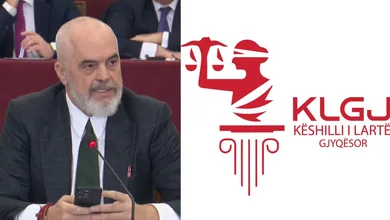
Ulsi Manja offered himself today as Edi Rama's lawyer in the action for the demolition of illegal constructions, just a few days before the Prime Minister forms the new government, where it is not known whether the Minister of Justice will continue to be part of the new government cabinet. In the latest reaction, Manja takes it upon himself to translate the Prime Minister's action, saying that the campaign for the demolition of illegal constructions is not a "summer whim of Edi Rama", nor a political game nor a maneuver to attract the public's attention from the topics of the day or political current affairs.
According to him, it is "a battle of vision" related to Albania in 2030 in the European Union.
The Minister of Justice lectures Albanians that "one does not enter Europe with unauthorized construction, with kiosks and metal tents that occupy public space, that block the entrances to buildings, with meat shops on the sidewalks, with terraces of buildings turned into gardens or illegal orchards, with builders who sell the same apartment three times...", and so on.
And in fact, he is right when he says that this is not the way to go to Europe. It's just that he seems to forget that Edi Rama has been governing Albania for 12 years, and during these years he has allowed illegal construction, the occupation of public spaces, the alienation of property, the concreteization of Albania, the destruction of protected areas, the theft of millions through affairs such as incinerators, sterilization, Check-Up, and so on. In fact, many of these constructions that prevent Ulsi from seeing European Albania were built when Ulsi was warming the minister's chair and eating meatballs at some stall built without permission.
Moreover, the Minister of Justice calls anyone who criticizes the government's action a "public mourner." Taking away my personal right to think that it is not governed by actions and more than tents, Tirana is unlivable from the huge and tasteless concrete, garbage, noise and chaos. But for Ulsi as a banal servile of the big boss, the length of thought goes to what Edi Rama says. And thank goodness we don't live in a system where Ulsi could be the head of the deportation office.
"Edi Rama was voted by the people and is on the side of the common good," Ulsiu writes and that's enough. At least he is aware that with his lack of culture he could confuse one of God's messengers on earth with the great boss. And for this reason he has been told to be careful that the boss is both Catholic and Orthodox, and maybe even a little Muslim. So it's better without specific names.
As a former prosecutor with a failed career, Ulsiu has today also provided Edi Rama with unsolicited advocacy for the latter's clashes with prosecutors and judges. "If there is a clash today, it is not Rama against justice, nor Rama against the citizens, but good against evil," Manja writes, further emphasizing that "the fourth mandate is a commitment to establish control over the territory by any legal means, to end chaos and pollution."
It's as if these 12 years in government have been some anonymous people that Ulsiu doesn't know and not the SP, his friends and comrades in the SP. In fact, the only one that can make a character like him a minister.
How they stole and destroyed everything, how ministers one after another ended up in prison for affairs, how dozens of officials were caught extorting millions from tenders – this is a topic that Ulsiu does not touch. Even Rama's important minister, the man who is supposed to be the symbol of justice in the government, does not even dare to mention that the number two of the party that made him a minister is now behind bars.
Perhaps someone should explain to comrade Ulsi the early history of his party. Where the close friends and comrades of the leader did not have a long career or life without his approval. This is also the curse that follows the SP, the worthy successor of Enver Hoxha's Party, which at the end of its life had gotten rid of all its old friends and comrades. Only by listening to the elders of the Party of Labor, Ulsi can understand that the new and old leaders are not flattered by servility. Especially those that have neither style nor artistic form. Therefore, in these cases, since the books are a little difficult to read, it is good to sit down with an old friend and listen to some of the history of the party. Of the old and the heir, which differ little in form and not at all in content. Where friends and comrades who share power and money suddenly turn into sworn enemies and can be "shot" with or without trial. But always with the blessing of the leader. And maybe after this he can understand and become aware that servility not only cannot make him a minister, but it also does not save him from the political "guillotine".
And in the end, he needs to understand and learn what every "victim" of that party says at the end of his political career with complete conviction and desire: my party condemned me.

















